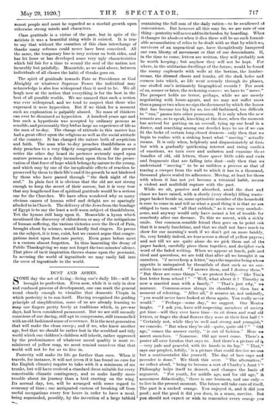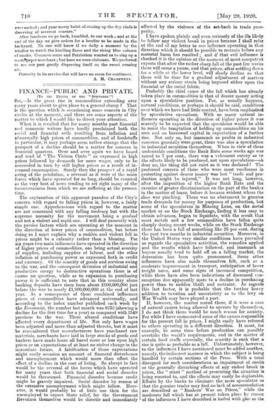DUST AND ASHES.
SOME day the art of living—living one's daily life—will be brought to perfection. Even now, while it is only in slow and confused process of development, one can mark the general trend clearly enough to visualize that domestic Utopia in which posterity is to sun itself. Having recognized the guiding principle of simplification, some of us are already learning to snap our fingers pretty freely at traditions which, in pre-war days, had been considered paramount. But we are still uneasily conscious of our daring, still apt to compromise, still trammelled with an old-fashioned sense of reverence. It is the next generation that will make the clean sweep ; and if we, who knew another age, feel that we should be rather lost in the scrubbed and tidy world which our children's children will inherit, rather oppressed by the predominance of whatever moral quality is most re- miniscent of yellow soap, we must remind ourselves that that world will not be for us to live in.
Posterity will make its life go further than ours. When it travels, for instance, it will not (even if it has found no cure for the English climate) require to take with it a minimum of six trunks, but will have evolved a standard dress suitable for every conceivable climatic contingency, and so make hardly more trouble about its journey than a bird starting on the wing. Its normal day, too, will be arranged with some regard to economy of time ; our antiquated custom of breaking off from useful occupations every few hours in order to have a meal, being superseded, possibly, by the invention of a large tabloid
containing the full sum of the daily ration—to be swallowed at convenience. But however all this may be, we are sure of one thing—posterity will never add to its burden by hoarding. When it changes its abodeor when it dies there will be no such formid- able accumulation of relics to be dealt with as that by which wo, survivors of an unpractical age, have thoughtlessly hampered our own liberty...of movement or that of our descendants. If, in the time to come, letters are written, they will probably not be worth keeping.; but anyhow they will not be kept. For where, in the utilitarian dwellings of the future, would be found the roomy cupboards with wells at tho bottom, the lumber- rooms, the disused chests and trunks, all the dark holes and corners into which, as life went serenely through its phases, one stuffed one's intimately biographical records ? For most of us, sooner or later, the reckoning comes : we have to " move." The prospect holds no terror, perhaps, while we are merely negotiating with house-agents, and we may not suffer more than a pang or two when we sign the document by which the house that has become too big for us, too old-fashioned, too difficult to " run," passes into other possession. It is only when the new tenants are, so to speak, knocking at the door, when the moment has arrived for putting on an overall, tying up our head in a duster, and searching among our derelict keys to see if we can fit the locks of certain long-closed drawers—only then that we begin to realize with a sinking heart what " moving " actually means. It is only when, helplessly and dispassionately at first. but with a gradually quickening interest and rising conflict of emotions, we turn over and unfasten and examine thcar bundles of old, old letters, those queer little odds and ends and fragments that are falling into dust—only then that we understand " moving " to be as ruthless a process as that of tearing a creeper from the wall to which it has in a thousand, thousand places sealed its adherence. Moving, at least for those with whom it has not yet become a triennial habit, means a violent and multifold rupture with the past.
While we sit, pensive and absorbed, amid the dust and chaos we have raised, with a slowly (very slowly) filling waste- paper basket beside us, some optimistic member of the household is sure to come in and tell us what a good thing it is that we are obliged to turn out " all that rubbish," as it was very unwhole- some, and anyway would only have meant a lot of trouble for somebody after our decease. To this we assent, with a sickly smile. Our common-sensible friend then goes on to point out that it is nearly lunchtime, and that we shall not have much to show for our morning's work if we don't get on more briskly, So, very briskly indeed, we tear across a sheaf of yellow papers ; and not till we are quite alone do we pick them out of the paper basket, carefully piece them together, and decipher each word of the faded writing. When we appear at lunch, pale and tired and querulous, we are told that after all wo brought it on ourselves. "I never keep a letter," says the superior being whoae appetite is unimpaired by throatfuls of dust such as we our- selves have swallowed. " I answer them, and I destroy them." " But there are some things "—we protest feebly—" like Tim's first letter from school ? " " Well, what about it ? Timothy is now a married man with a family." " That's just why," we murmur. Common-sense shrugs its shoulders ; then has a moment of relenting. "After all," it assures us, not unkindly, "you would never have looked at them again. You really never would." " Perhaps—some day," we suggest. Our Mentor laughs. " I ask you, have self-respecting members of society got time—will they ever have time—to sit down and read old letters, or finger the dead flowers they wore at their first ball ?
" Certainly not, while they're well and strong and youngish," we concede. " But when they're old—quite, quite old ? " " Old age," comes the answer curtly, "is out of fashion." Here we assert ourselves. " Nonsense. Old age must come. There's a poster all over London that says so. And there's a picture of ie —very pale and peaceful, with its hands in its lap." " That," says our prophet, loftily, "is a picture that could deceive no one but a sentimentalist like yourself. The day of lace caps and lavender is done." We think this over. " The alternative," we reflect aloud, " being to become a sort of Charley's Aunt ? " Philosophy helps itself to dessert, and changes the basis of argument. " For youth, for middle ago, and for old age," it announces didactically, " there is one business, and one only— to live in the present moment. The future will take care of itself. The past is a sucked orange. You enjoyed it, and it did you good ; and the good it did you does, in a sense, survive. But you should not expect or wish to remember every orange you ever sucked ; and your messy habit of storing up the dry rinds is deserving of severest censure."
After luncheon we go back, humbled, to our work ; and at the end of the day we give orders for a bonfire to be made in the backyard. No one will know if we dally a moment by the window to watch the kindling flame and the rising blue column of smoke. Common-sense and Patriotism wanted us to ring up a wastMpaper merchant ; but here we were obdurate. We preferred to see our past gently dispersing itself on the sweet evening sir.
Posterity in its service-flat will have no room for sentiment.
A. M. CHANPNEYS.







































 Previous page
Previous page